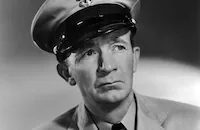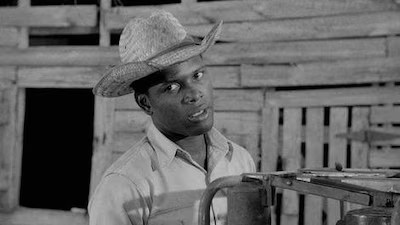Good-Bye, My Lady

Brief Synopsis
Cast & Crew
William A. Wellman
Walter Brennan
Phil Harris
Brandon De Wilde
Sidney Poitier
William Hopper
Film Details
Technical Specs

Synopsis
In Mississippi swamp country, kindly Jesse Jackson is rearing his orphaned nephew Claude, whom he has nicknamed Skeeter. Although the toothless, illiterate older man cannot teach him what is taught at school, he lets Skeeter practice reading to him and shows him the right way to live in harmony with nature. During a moon-filled night, Skeeter hears a strange sound and wakes Jesse. He tells Jesse the sound was "like a ghost laughing." As uncle and nephew leave their weather-beaten cabin to find the source of the sound, Skeeter chatters away about his desire to own a .22 gauge shotgun for hunting. Soon they encounter a creature that looks like a dog, licks itself like a cat and does not bark, but makes a laughing sound. Unlike other creatures, the animal can smell them from a great distance and shyly runs away from them. The next day, their friend, storekeeper "Cash" Evans, drops by with groceries. After hearing about the creature, he lets his hunting dog and hog hounds loose, and he and the Jacksons follow them. They determine that the creature is a dog, and when she outruns and outsmarts Cash's highly trained dogs, the storekeeper is amazed. Later, sensing that the dog wants him as much as he wants her, Skeeter patiently lures her with food. The little dog's eyes are filled with tears when Skeeter gets near her and takes her home. Skeeter and the dog, which he names "Lady," become inseparable. Lady sleeps with Skeeter and eats the same meager meals as the Jacksons. At mealtime, remembering the taste of hickory nuts, Jesse talks about buying "Roebuckers," which is his name for false teeth from the Sears Roebuck catalog. Fearing that Lady could be harmed by the alligators in the swamp, Skeeter sternly trains Lady to go against her instincts and chase birds, instead of swamp rats. One of Skeeter's chores is to get buttermilk from Bonnie Dew and her oldest son Gates, African-Americans who live across the river. Bonnie Dew is shocked to learn that Jesse lets Skeeter drink coffee, even though Jesse always adds a little milk. Gates, a perceptive man, asks Skeeter what is bothering him and assures him that dogs can be taught to do anything but laugh and cry. After several months of training Skeeter, Lady surpasses the hunting skills of Cash's new English setter, Millard Fillmore. News travels that Lady can run faster than other hunting dogs and smell prey over fifty yards away, bringing whole families to the backwoods cabin to see her. One day while Skeeter is out, Cash visits Jesse reluctantly to tell him about a lost-and-found ad he read in a magazine, reporting that a rare African hunting dog, called a Basenji, was lost in their area. The lost dog, named "Isis of the Blue Nile," fits Lady's description. Cash suggests not telling Skeeter about Lady's rightful owner, who lives in Connecticut, but Jesse feels a moral obligation to tell Skeeter the truth. That evening, when Jesse tells Skeeter, the boy tries to deny that Lady is the dog described in the ad and Jesse promises to respect his decision. However, after some thought, Skeeter announces that he must contact the owner. Unsure of the best way to reach the owner, Skeeter consults Gates, who admits to seeing the ad and offers to send a telegram on Skeeter's behalf. Almost in tears, Skeeter demands to know why Gates never mentioned the ad earlier, when parting with the dog would have been easier for him. Gates says that he tried to catch the dog himself for the reward, but the dog chose to be with Skeeter and he could see how Skeeter "ached" for the dog. Later, in response to the telegram, Walden Grover, an employee of the kennel that owns Lady, comes to the cabin to retrieve her. While waiting for Skeeter and Lady to return from the woods, Grover and Jesse behave with stiff politeness, until Jesse, admitting that they are both "a bit touchy," invites him into the cabin. Grover confides his discomfort about separating the boy from the beloved, but rare and expensive dog. When Skeeter is late coming home, Grover goes to Cash's store to wait. Later Skeeter, Jesse and Lady arrive, and Skeeter apologizes for his tardiness. Instead of the fifty dollar reward promised in the ad, Grover gives Skeeter one hundred dollars for the return of Lady. When Cash suggests that Skeeter could buy one of Lady's litter, Skeeter says that the puppy would remind him of Lady and prolong his grieving. Hearing this, Grover promises not to write him to report how Lady is doing. Because Lady refuses to obey Grover's order to go to the car, Grover asks Skeeter to carry her there. At first Skeeter refuses, feeling that he has done enough, but then agrees, admitting that Grover paid him fairly. After putting the crying dog in the carrier in the back of Grover's truck, Skeeter says "good-bye, my Lady," and Grover drives away. Cash consoles Skeeter that Lady will be well cared for and asks him to train Millard Fillmore. Jesse expects Skeeter to decline the offer, but, to his surprise, Skeeter agrees that "Old Mill" barks like the kind of dog he is used to, and adds that Lady will be better off eating meat every day. With his money, Skeeter insists that he will buy Jesse the best set of false teeth in the Sears Roebuck catalog and asks Cash to place an order. Cash suggests that there will be enough money left to make a down payment on a shotgun. Skeeter brightens, momentarily forgetting that Lady will not be there to hunt with him, but decides to go ahead with the plans. Cash offers them coffee and Jesse, observing that Skeeter is growing up, serves him his coffee black.

Director

William A. Wellman
Cast

Walter Brennan

Phil Harris

Brandon De Wilde

Sidney Poitier
William Hopper

Louise Beavers
Crew
Laurindo Almeida
Edward G. Boyle
Al Cavigga
William H. Clothier
Earl Crain Jr.
Dave Depatie
Nate H. Edwards
Moris Erby
Robert Fellows
George Field
Sid Fleischman
Gordon B. Forbes
Gordon Gurnee
Hazel Hall
Joseph Labella
Fred Macdowell
Al Murphy
Web Overlander
Donald A. Peters
Don Powell
Paul Reuting
Jeff Selznick
Carl Walker
Michael Wayne

Videos
Movie Clip



Film Details
Technical Specs

Articles
Good-bye, My Lady - Goodbye, My Lady
According to Poitier's autobiography, actress Lauren Bacall, who had co-starred with Wayne in Batjac's Wellman-directed Blood Alley (1955), knew Wayne and Wellman were looking for an African-American actor for an important role in Good-bye, My Lady, and suggested that they take a look at Poitier's performance in Blackboard Jungle. They did, and were equally impressed.
Based on a novel by James H. Street, Good-bye, My Lady is a coming of age story about an adolescent orphan (Brandon De Wilde), nicknamed Skeeter, growing up in the Mississippi swamp with an elderly, uneducated uncle (Walter Brennan). Skeeter finds a strange dog which doesn't bark, but makes a noise which sounds like a laugh, and even cries real tears. Naming the dog Lady, Skeeter trains her with the help of his neighbor, Gates, played by Poitier. The dog turns out to be a basenji, a rare African hunting dog, which had been lost in the area by her owner, and Skeeter must make his first grown-up decision - whether to return the dog which has become his pet and constant companion, or keep her.
The basenji was played by a puppy named "My Lady of the Congo," raised by a breeder in England and imported for the film, along with four others to serve as doubles, including her brother, My Lord of the Congo, although Lady ended up doing most of her own stunts. Before production began, Lady and De Wilde had time to bond, and became so close that her owner agreed to let De Wilde keep her as a pet.
Unusual for the segregationist era and the Deep South setting of the film, Poitier's character in Good-bye, My Lady is educated, dignified, and a wise big brother figure to the 14-year old Skeeter. Wellman, whose gruff, macho manner hid his "sensitive, artistic inclinations" according to Poitier, allowed those inclinations to be seen not only on film, but off-screen as well. The film was shot on location near Albany, Georgia, where the company took over a local hotel. In his memoirs, Wellman recalled that on their first night there, he looked around at dinner and didn't see Poitier. When he inquired about the actor's whereabouts, he was told that Poitier was forced to eat in the kitchen. Wellman writes that he went back to the kitchen and ate with Poitier, and that he complained to the management and threatened to take his business elsewhere. In his own memoirs, Poitier does not mention the incident, but writes, "I found William Wellman to be a truly wonderful man. In later years, when I began directing films myself, I would come to fully appreciate his remarkable talents."
Wellman called Good-bye, My Lady "one of the best I ever made," but added that it was "a financial fiasco. I don't know why. The story was beautiful, the performances were superb. How could you miss? But I did." It was Wellman's final film for Batjac. He made only two more films, Darby's Rangers and Lafayette Escadrille, both released in 1958.
Producer: John Wayne
Director: William A. Wellman
Screenplay: James H. Street (novel); Albert Sidney Fleischman
Cinematography: William H. Clothier
Art Direction: Don Peters
Music: Laurindo Almeida, George Fields
Film Editing: Fred MacDowell
Cast: Walter Brennan (Uncle Jesse Jackson), Brandon De Wilde (Skeeter, Claude), William Hopper (Walden Grover), Phil Harris (Mr. Cash), Sidney Poitier (Gates), Louise Beavers (Bonnie Drew).
BW-96m.
by Margarita Landazuri

Good-bye, My Lady - Goodbye, My Lady
Quotes
Trivia
According to Hedda Hopper's column of August 28, 1955, director William Wellman was planning to cast Vivian Vance and William Frawley (the Mertzes in "I Love Lucy" (1951)) to play a married couple in a single scene for this film.
Notes
The title card reads: "Warner Bros. presents William A. Wellman's Good-Bye, My Lady." The onscreen credits for Laurindo Almeida and George Field read as follows: "Music composed and played by Laurindo Almeida-Guitar, A.S.C.A.P.; George Fields-Harmonica, A.S.C.A.P." During the film, an offscreen narrator conveys the passage of time. Portions of the film, among them the hunting sequences, were shot in Albany, GA, and also at the Samuel Goldwyn Studios, according to an August 1955 Hollywood Reporter news item. In his autobiography, Sam O'Steen stated that he served as assistant film editor for the film.
According to Warner Bros. production notes, upon completion of the film, Wellman gave the dog who played "Lady" to actor Brandon de Wilde, who portrayed "Skeeter." In his 1974 autobiography, Wellman expressed annoyance over the film's financial failure, especially considering that the National Society of the Daughters of the American Revolution awarded him a plaque proclaiming Good-Bye, My Lady "the Best Children's Picture of the Year 1956."














